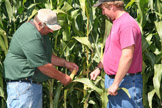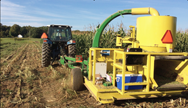 NNY Corn Grain Evaluation Helps Farmers Select Seed, Feed Cows, Sell to Ethanol Producers
NNY Corn Grain Evaluation Helps Farmers Select Seed, Feed Cows, Sell to Ethanol Producers
Northern N.Y. The evaluation of 103 commercial corn hybrids in trials funded by the farmer-driven Northern New York Agricultural Development Program is now posted at www.nnyagdev.org. The trials under localized growing conditions help farmers select the corn hybrids best suited to their soils, agronomic practices, and needs, including use of the corn in a dairy cow diet and for production for sale to ethanol producers.
“Over the past 20 years, corn acres harvested as grain in the six-county Northern New York region have doubled, reflecting availability of hybrids with good yield and adaptation in this shorter-season area. Highly productive grain hybrids that perform in Northern New York allow farmers there to take advantage of corn grain and ethanol markets,” said project leader Dr. Margaret E. Smith, a plant breeding and genetics professor at Cornell University Smith.
Project collaborator Joe Lawrence, a dairy forage specialist with the Cornell University PRO-DAIRY program, “A focus by the seed industry on silage-specific corns has increased the need for independent evaluation of the corns’ traits, particularly to determine their merit in a dairy feeding program.”
Cornell PRO-DAIRY Director Thomas Overton notes, “We use the data from the Northern New York corn hybrid trials, and those conducted elsewhere in New York State, to evaluate how those hybrids will interact in a lactating cow feed ration and how that ration may influence expected cow performance and milk production.”

The 2017 hybrid evaluation trials, planted at the Cornell Willsboro Research Farm in Essex County, W. H. Miner Agricultural Research Institute in Clinton County, and Greenwood Farm in St. Lawrence County, evaluated 103 hybrids ranging from 80-day to 110-day maturity corns.
The Northern New York Agricultural Development Program project report notes that data on yield-to-moisture ratio comprises one of the best guides for selecting hybrids with excellent grain yield and appropriate maturity for Northern New York growing conditions. Grain yield is an important contributor to silage yield and quality and a consideration for farmers interested in selling their corn grain for feed or ethanol production
For silage, collaboration by hybrid evaluation projects across the Northeast, including the trials in Northern New York, continue to focus on key quality parameters’ related to fiber and starch digestibility.
Smith cautions that farmers should select hybrids based on multi-year and multi-location data whenever possible.
“Any hybrid can have a banner year or banner environment, but not necessarily hold up over different locations and growing seasons. Selections are best judged with several years of data under the regionalized growing conditions and the knowledge of one’s own soils, climate, and farm environment,” says Smith.
Multi-year corn hybrid evaluation data are available in the Cornell Guide for Integrated Field Crop Management. For assistance, contact Cornell Cooperative Extension NNY Field Crops Specialists Mike Hunter, 315-788-8602, or Kitty O’Neil, 315-854-1218.
Farmers in Northern New York have harvested an average of 145,000 acres of corn annually for grain and silage over the past four years.
Funding for the Northern New York Agricultural Development Program is supported by the New York State Senate and administered by the New York State Department of Agriculture and Markets.
Links to 2017 Corn Hybrids report and tables
Links to multiple years of NNY Corn Grain and Corn Silage trials data